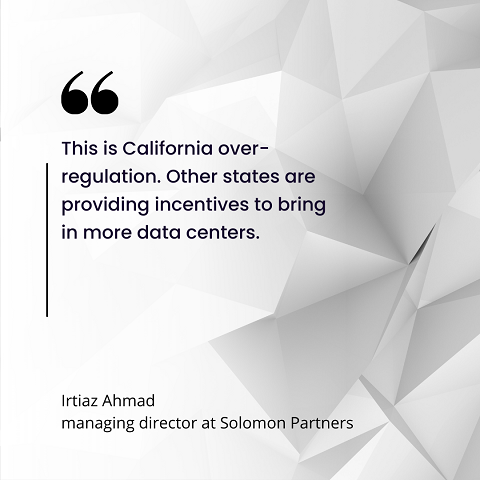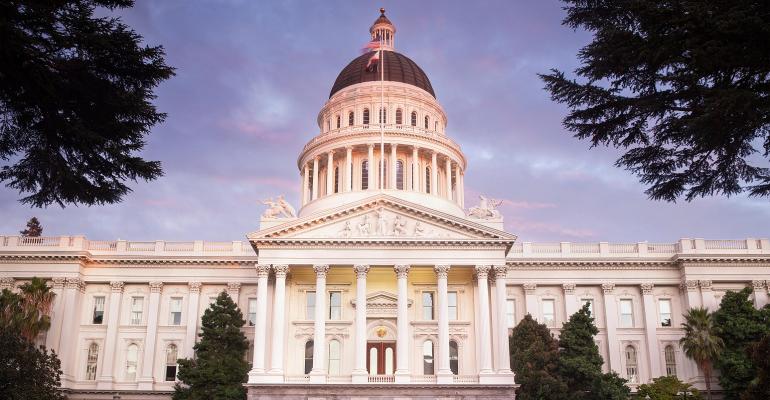In early October, California Gov. Gavin Newsom signed two bills into law, the Climate Corporate Data Accountability Act (SB 253) and the Greenhouse Gases: Climate-Related Financial Risk Act (SB 261). Both SB 253 and SB 261 require corporations to report significant impacts they are having on the climate and are in some cases even stricter than climate disclosure rules the U.S. Securities and Exchange Commission introduced in March 2022.
The two bills put the California Air Resources Board (CARB) in charge of adopting regulations that will require companies doing business in California to meet additional reporting requirements by as soon as 2026.
SB 253 requires large businesses to disclose both their direct and indirect greenhouse gas (GHG) emissions. That means data center operators will have to report the emissions from their facilities, having to account for the carbon footprint of all of their servers, storage, networking, UPS, HVAC, and other equipment in the data center. On top of that, they will also have to report emissions from their supply chains, transportation, and business activities.
SB 261 requires covered entities to prepare a report that discloses their climate-related financial risks —both their own and those of their supply chain — and what steps they have taken to remedy the problem.
What the Climate Disclosure Laws Mean for California Data Centers
The good news is that SB 253 applies to "reporting entities" with annual revenues exceeding $1 billion and doing business in California. That $1 billion cutoff means smaller data center providers will be exempt — that is until the business grows to $1 billion. But the bill will undoubtedly impact the hyperscalers and major colocation providers.
The question now becomes whether this will be a California phenomenon or if the idea will spread to other states or even go national.
The California Chamber of Commerce was not pleased with the passage of the law, saying in a statement, "We are disappointed that SB 253 and SB 261 were signed today. SB 253 and SB 261 are major changes in climate policy and will add considerable obligations on affected businesses. We look forward to working with the Governor's office on SB 253 clean-up legislation that will address some of the major concerns of our members, particularly the impact on small business."

Irtiaz Ahmad, managing director at Solomon Partners, also had concerns for California businesses. "While sustainability has become core to the hyperscale cloud and other large technology tenants, monitoring and ensuring forced compliance across the full supply chain becomes yet another undue burden for placing a new data center development in California," he said.
Also, there is confusion over who actually bears this burden, Ahmad said, wondering if it is the data center operator who owns the underlying real estate or the tenant who occupies and outfits the property with servers and other computer equipment of their choice.
How the Climate Disclosure Legislation Will Benefit Rest of the Country
Ahmad doesn't believe this type of legislation will spread to other states. "This is California over-regulation," he said. "Other states are providing incentives to bring in more data centers."
These climate disclosure laws come at a time when high power, land, operating, and tax costs have been driving anything beyond the most sensitive, latency-centric new developments out of California and into adjacent regional markets, namely Phoenix; Las Vegas; Hillsboro, Oregon; and even Dallas, he noted.
Operators such as Compass Datacenters, Aligned Data Centers, STACK Infrastructure, and Flexential have been some of the beneficiaries of the trend of California flight with their strong presence in a number of these alternative markets.
"Increased regulation in California will likely have a positive impact in the continued growth of these markets, while limiting the wholesale-oriented developments in the Valley and other California submarkets," Ahmad said.
Analysts believe that this type of legislation will be isolated to California, at least for now, while the SEC receives input on its climate disclosure policies.
"California typically leads the nation on environmental sustainability, or on what I would say in environmental matters, much like they … have specialized carbon emission laws on cars. And it's because of the concentration of IT companies that exist in California, they're also trying to be more ambitious," said Sean Graham, research director, Cloud to Edge Datacenter Trends, at IDC.
Abhijit Sunil, senior analyst with Forrester Research, sees an upside to the regulation. "For data centers, they will definitely need to have a good [ESG] team to help with this," he said. "But I feel more regulations will help force organizations to look into their supply chain, to work with their own vendors further, and therefore start more conversations around measuring metrics."
Graham, however, doesn't believe a thorough accounting of every component is feasible. "I don't think that companies have a good handle on how to attribute that overall energy spend at a product level," he said. "Let's say my total carbon emissions are 1 million tonnes, and I'm a server manufacturer. But I have five different product lines. I don't necessarily know how to attribute that to at a product level."





